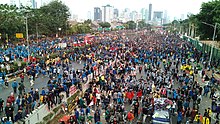This article contains too many pictures for its overall length. (August 2024) |

| Part of the Politics series |
| Democracy |
|---|
|
|



A political demonstration is an action by a mass group or collection of groups of people in favor of a political or other cause or people partaking in a protest against a cause of concern; it often consists of walking in a mass march formation and either beginning with or meeting at a designated endpoint, or rally, in order to hear speakers. It is different from mass meeting.
Actions such as blockades and sit-ins may also be referred to as demonstrations. Demonstrations can be nonviolent or violent (usually referred to by participants as "militant"), or can begin as nonviolent and turn violent depending on the circumstances. Sometimes riot police or other forms of law enforcement become involved. In some cases, this may be in order to try to prevent the protest from taking place at all.[citation needed] In other cases, it may be to prevent clashes between rival groups, or to prevent a demonstration from spreading and turning into a riot.